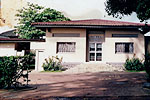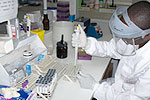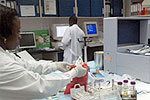Strengthening Health Systems - CDC marks 20 years in Cote d'Ivoire

This year, the Centers for Disease Control and Prevention (CDC) celebrates its 20th anniversary in Cote d'Ivoire. In 1987, Dr. Kevin DeCock, a CDC epidemiologist, and Professor Odehouri Koudou, a doctor from the Cote d'Ivoire Ministry of Health (MOH), helped shepherd the first public health agreement between their two countries. In 1988, they established a field station in Abidjan and over the next 16 years expanded the Retrovirus Cote d'Ivoire (CDC Retro-CI) project to tackle some of the most important questions about HIV worldwide, while strengthening the overall health system and workforce. With the introduction of the President's Emergency Plan for AIDS Relief (PEPFAR) in 2005, the initial agreement to conduct epidemiological research on HIV has grown to support the expansion of HIV prevention, care, and treatment in Cote d'Ivoire.
CDC/PEPFAR continues to evolve its role in the Cote d'Ivoire national response to HIV. As one MOH official shares: "CDC has enormous trust in the country because it stayed, despite all the violence and upheavals, it maintained its partnership and continued supporting the HIV program in Cote d'Ivoire. CDC will always be respected for that."
Surveillance
CDC worked side by side Ivoirian scientists to produce an extensive body of some of the first epidemiological and scientific research in Africa on HIV I and II, tuberculosis, prevention of mother-to- child HIV transmission (PMTCT), and opportunistic infections. CDC then helped the Cote d'Ivoire MOH to establish a comprehensive HIV surveillance system at over 40 antenatal health clinics throughout the country, a system that presently produces Cote d'Ivoire's routine HIV data. CDC currently is helping establish a national health information system that harmonizes the patient monitoring conducted at health facilities across the country with WHO guidelines.
Strengthening the MOH
As a result of the findings of CDC-supported epidemiological research, the MOH established the first government office to combat HIV/AIDS in 2001. CDC strengthened the role of this MOH office through support for policy development, training of staff, infrastructure strengthening, and informatics support. One MOH official states that "before (CDC) there was chaos, no HIV testing. CDC helped organize our national fight against HIV." CDC's close relationship with the MOH continues to this day, through major cooperative agreements that provide direct funding and technical assistance on prevention, care and treatment activities.
The Lab
 When
CDC first established an office in Abidjan, in 1987, there was no national
reference laboratory and no lab was conducting HIV testing. CDC soon helped
develop Cote d' Ivoire's first national reference laboratory,
which conducted all HIV testing for the country for many years. By 1992, the
lab was recognized as a world-class facility, producing advanced diagnostics
both for clinical and research purposes. "No one thought there could be a
P-3 TB lab in Africa, but we showed them it was possible," said Kuoadio
Justin, one of CDC Retro-CI's first lab technicians.
When
CDC first established an office in Abidjan, in 1987, there was no national
reference laboratory and no lab was conducting HIV testing. CDC soon helped
develop Cote d' Ivoire's first national reference laboratory,
which conducted all HIV testing for the country for many years. By 1992, the
lab was recognized as a world-class facility, producing advanced diagnostics
both for clinical and research purposes. "No one thought there could be a
P-3 TB lab in Africa, but we showed them it was possible," said Kuoadio
Justin, one of CDC Retro-CI's first lab technicians.
With top-notch physical infrastructure and expertise, the lab served as a center of excellence for the region. Hundreds of laboratory personnel from across Cote d'Ivoire and the region would attend yearly workshops and on-site tutorials at the CDC Retro-CI lab, and many CDC Retro-CI lab personnel were detailed or employed to help establish similar laboratories in other countries. After a few years of working side-by-side with CDC lab experts, the lab was led and run entirely by Ivoirian staff.
Health Workforce Development
 Human capacity and health workforce development has been the keystone of the
HIV/AIDS activities supported in Cote d'Ivoire. The country's capacity to
sustain activities would require building a national cadre of Ivoirian
public health, laboratory, and medical providers to implement national
HIV/AIDS services. CDC soon established a comprehensive program of
pre-service and in-service training and close mentorship of Ivoirian
students, medical professionals, and MOH staff in the areas of public
health, laboratory and behavioral sciences, epidemiology, clinical services,
research and more.
Human capacity and health workforce development has been the keystone of the
HIV/AIDS activities supported in Cote d'Ivoire. The country's capacity to
sustain activities would require building a national cadre of Ivoirian
public health, laboratory, and medical providers to implement national
HIV/AIDS services. CDC soon established a comprehensive program of
pre-service and in-service training and close mentorship of Ivoirian
students, medical professionals, and MOH staff in the areas of public
health, laboratory and behavioral sciences, epidemiology, clinical services,
research and more.
PEPFAR
In 2005, Cote d'Ivoire became one of 15 PEPFAR focus countries. According to Bruce Struminger, Director of CDC Cote d'Ivoire, CDC's prior scientific contributions, partnership with the MOH, and efforts to strengthen the health system and workforce helped lay the groundwork for the achievements of PEPFAR today. CDC continues to support PEPFAR as the only USG implementing partner with an office in the country, and works in close partnership with other USG government agencies, multilaterals organizations, and other international and indigenous stakeholders, to help expand HIV prevention, care, and treatment services broadly throughout the country. For more on PEPFAR's role in Cote d'Ivoire, please see the PEPFAR Cote d'Ivoire country profile.
Examples of CDC and CDC/PEPFAR achievements in Cote d'Ivoire:
- Becoming one of the first four developing countries in the world to pilot ART. By 2000, more than 5000 patients were on ART and CDC supported all HIV diagnostics and HIV patient monitoring.
- Providing HIV testing and counseling at TB centers a decade before this was available in Africa.
- Establishing a regional center of excellence where laboratory technicians from Mali, Senegal, Ghana, and other countries can receive training.
- Expanding ART to over 40,000 patients in 2008 at 143 sites.
- Extending PMTCT counseling and testing services to over 189,1000 pregnant women.
- Establishing a routine sentinel surveillance system at 40 antenatal care sites across the country.
Last reviewed: December 17, 2008
Content Source:
Global AIDS Program (GAP)
National Center for HIV/AIDS, Viral Hepatitis, STD, and TB Prevention

